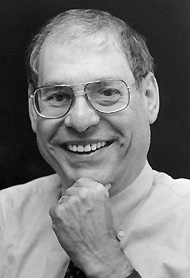![]()
Departments
![]()

|
Week of 15 October 1999 |
Vol. III, No. 10 |
Feature
Article
University Lecture
Dallek to address presidential 'disability'
By Eric McHenry
At first glance, Presidential "Disability": An American Dilemma might not look like the most promising topic for the University Lecture. There's been only one famously "disabled" president, polio victim Franklin Delano Roosevelt, and he's better known for resolving national dilemmas than for posing them.
But according to Robert Dallek, CAS professor of history and this year's University Lecturer, physical and psychological disabilities of the sort that threaten job per formance have been common among American presidents. One of the reasons that fact is not better known, he says, is that presidents and their protectors have worked so hard to conceal it. And often, he adds, the public has been complicit in the cover-up.
"What we have," says Dallek, "is a kind of unspoken, unwritten alliance between presidents and the public -- that officials won't talk about a president's physical or emotional limitations, and the public won't inquire too deeply into them.
"I think that's a real problem," he says. "We've got to be more realistic, because at some point this is going to create a crisis and we won't be prepared for it."
Grover Cleveland, Dallek points out, had secret surgery aboard a yacht in Manhattan's East River while president. A team of doctors extracted a malignant tumor from his mouth, replacing a substan tial part of his jaw with a rubber prosthesis. The public was not notified until 1917, 24 years after the surgery and 9 years after Cleveland's death, when one of the doctors published an article. Far worse was the case of Woodrow Wilson, who for much of his second term was president in name only: a series of strokes and other ailments had incapacitated him, leading to what one biographer has called a cover-up unprecedented in American history.
|
The University Lecture was established at Boston University in 1950 to honor faculty members engaged in outstanding research. The lecture provides an opportunity for all members of the University community -- as well as the general public -- to meet a distinguished scholar discussing a topic of recognized excellence. Each spring, all members of the faculty are invited to make nominations to the Graduate School of Arts and Sciences for the subsequent fall's lecturer. The University Lecturers from the previous five years act as the nominating committee. Past University Lecturers include John Malcolm Brinnin (1972), Lynn Margulis (1978), Millicent Bell (1983), and Roger Shattuck (1995). |
The second half of the 20th century, for its part, has seen a succession of presidents with serious health problems. Eisenhower suffered a heart attack and a stroke while in office. Kennedy had Addison's disease, an insufficiency of the adrenal gland. Johnson had a history of heart disease. Reagan dealt with the lingering effects of an assassination attempt, and perhaps, the first manifestations of Alzheimer's disease while serving. And Bill Clinton -- like Lincoln, Coolidge, Johnson, Nixon, and others before him -- has battled psychological problems. These recent leaders have tended to be more forthcoming than their predecessors, but the public's response has for the most part only reinforced the taboo of presidential disability. Observing the popular reaction to Clinton during the impeachment proceedings, Dallek says, was what prompted him to choose presidential disability as his lecture topic.
"People were comfortable seeing Clinton get religious counseling," says Dallek, "but not psychological counseling, and that's troubling. I've been across so many of these presidential administrations, and the Clinton presidency struck me as a good example of how difficult it is for the country to accommodate itself to the idea that a president could have some emotional problems, could have some kind of 'disability' that ought to be honestly addressed."
How can presidential disability best be addressed? There is a constitutional amendment -- the 25th, drafted under Eisenhower and ratified during the Kennedy administration -- that provides for vice presidential succession in the event of presidential incapacity. But circumstances have yet to test its efficacy. If and when they do, Dallek says, its invocation must have a firm medical, not political, basis.
He therefore recommends the establishment of an independent medical office, which could assess the president's fitness to govern. Its members, nominated by the president and confirmed by the Senate, would serve in an advisory capacity only.
"There could be as many as five," he says, "nominated and approved the same way Supreme Court appointments go through. But they would not serve for a lifetime. They would serve for the duration of the president's term, be it four or eight years, and then move out. This would give presidents some confidence that they're not going to be subjected to hostile political attack by a board of medical specialists appointed by an opposing party. They'd be there as ombudsmen. They wouldn't have the power to force presidents to resign or suspend powers, but they could recommend it."
|
|
|
Robert Dallek Photo by Fred Sway
|
Dallek, who came to BU in 1996, is one of America's foremost scholars of the 20th-century American presidency, best known for his two-part biography of Lyndon Johnson. He is currently at work on a biography of John F. Kennedy, which he hopes to publish in 2003. He says he feels particularly honored by the invitation to give the University Lecture, which recognizes outstanding research, because he's still fairly new to the faculty.
"I'm very gratified by it," he says. "To be given this distinction so quickly is quite satisfying."
Robert Dallek will give the 1999/ 2000 University Lecture, Presidential "Disability": An American Dilemma, at 7:30 p.m. on Monday, October 18, at the Tsai Performance Center, 685 Commonwealth Ave. The event is free and open to the public.
